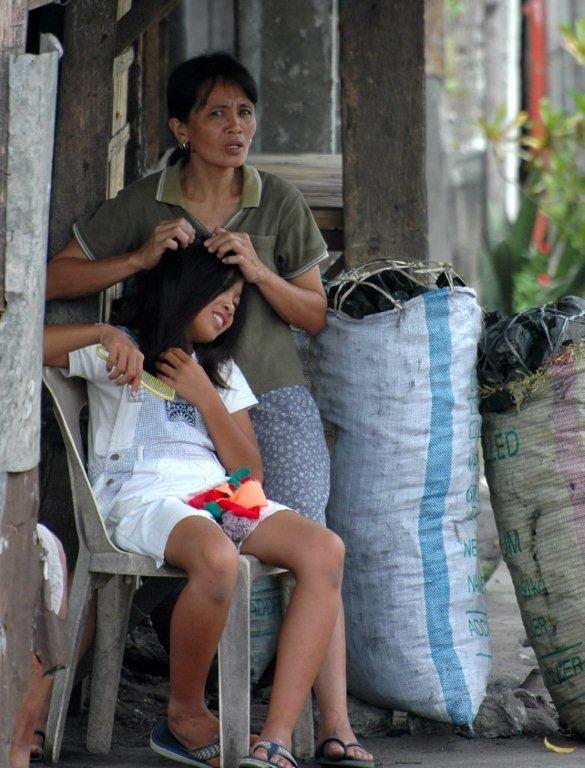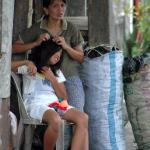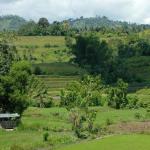The Last Tribes of Mindanao, The Tausug, People of the Current.
Tausug or Suluk is the name of an Islamized tribal group in the Sulu archipelago, and is taken from the words tau meaning man and sug meaning current.
Traditionally the Tausug are sailors, pearl divers and traders, their ancestral homelands in the Sulu Archipelago have vigorous tidal currents that flow from the Sulu and China Seas to the Celebes Sea. This translates literally into the name people of the current.
This native tribe, the first group in the archipelago to be converted to Islam, possess a courage that is beyond doubt, their bravery is supposed to be unquestionable, therefore the Tausug are often named Tau Maisug or brave people. They are proud Muslims renowned for their fierce resistance in the face of Spanish Conquerors, for 300 years the Tausug and the Spanish were engaged in almost continuous warfare, which ended when the Spaniards left the Philippines. The Tausug regards themselves superior to other Philippine Muslims and still live a combative way of life, running away from a fight is considered shameful. One old Tausug proverb says: Hanggang maybuhay, may pag asa, meaning; Never admit defeat as long as you live.
This homogeneous tribe is a blend of Malay and Indonesian races; they are widespread in the Philippines and can be found mainly in coastal area communities. They are distinctive from the Badjao Tribe by the aspects of their own culture and because they speak their own language. In the past the Tausug were boisterous pirates who infested the waters from the Sulu seas but nowadays make a living from agriculture, raising water buffaloes and fishing. Aside from being known as the best, gallant and ferocious freedom fighters of the world the Tausug are famous for being the best pearl divers in the world. Fishing is done in off-shore waters from motorized boats using bamboo traps, hook and line and fishing nets.
The strong-willed Tausug follow the Sunni Islamic beliefs and practices, Sunni Islam is the largest branch of Islam, the word Sunni comes from the word Sunnah meaning tradition. But indigenous beliefs endure, apart from Allah or Tuhan, the Tausug also believe in spirits that inhabit nature, especially rocks and trees, like the evil spirits named saytan and unseen creatures called jinn. According to the Tausug the human soul has four souls which leave the body when he dies, the life-soul related with blood, the spirit-soul connected with dreams, the soul of breath, associated with life and the transcendental soul. The body of the deceased will go to hell, to receive punishment for the sins committed while he was living. Various charms and belief in spirits, in order to gain success and good fortune, are still a great part of their daily life.
Tausug folk stories tell of great ancestors and legends, a favourite legend is the Kaawn of Bud Tumantangis, Mount Tumantangis, the highest peak in the province is called as such because, when sailing away, sailors cry when they lose sight of this landmarks and when they return, upon seeing again its silhouette from far away. The name Tumantangis comes from the word tangis, which means to cry, and bud meaning mountain, known to locals as the weeping mountain. The beautiful tomb of Sharif Abu Bakr, the founder of the Sulu Sultanate still exists on one of the slopes of Mount Tumantangis. The believes of the Tausug can be seen in their rituals and dances, many of them reflecting nature, such as the ebb and flow of the waves of the ocean, referring to their travels at sea.
The Pangalay, a traditional Tausug wedding dance and popularly known as the fingernail dance is one of the most well known dances, accompanied by a kulintang ensemble. This dance is distinctive because dancers use metal or golden nail extenders or janggay, which make the fingers stiff and set them apart from the thumbs. The Pangalay imitates the mythical Sarimanok bird, a reincarnation of a goddess who loved a mortal man, after the dance, she removes her nails and drops them to the ground, hoping that a man will gather them and will claim her for his bride. A Tausug marriage is usually arranged by parents, with the exception of the children of brothers, first and second cousins are favoured spouses. Marriageable women are kept in relative seclusion to protect their value to their family.
The Tausug tribe is one of the Muslim minorities in the Southern Philippines; they still retain many of the ancient practices and strong, dynamic traditions of their particular tribal heritages but are experiencing a great deal of change. The traditional Tausug culture is diminishing because of the influences of the modern Philippine society. Many of the Tausug are living below poverty level and have been displaced from their homes and livelihoods by the wars and armed conflicts between rebel groups and the Philippine government.
The Tausug, a rough tribe that roamed the Southern Seas and resisted foreign intruders at land is at present caught, in the middle of nowhere.
 ThingsAsian
ThingsAsian




















